SINGAPORE: A Reddit post highlighting the lack of English signage and menus at some Mainland Chinese restaurants in Singapore has sparked widespread debate about accessibility and inclusivity for non-Chinese speakers.
Published on the r/singapore subreddit on 16 June, the post raised concerns about a growing trend, with more Chinese eateries — particularly smaller establishments — offering menus almost entirely in Chinese, with little to no English translations.
The original poster (OP), who identified as an Indian Muslim with a passion for trying different cuisines, emphasised that the issue was not about halal options or anti-Chinese sentiment, but about accessibility in a multicultural society like Singapore.
“This isn’t meant to be political, but rather a personal concern,” the OP wrote.
They noted that the post was not aimed at larger chains like HDL, Luckin, or Chagee, but at smaller eateries in areas such as Bugis and Clementi, where there is a growing Mainland Chinese population.
“The issue with PRC restaurants isn’t that they’re everywhere, or even their effects on rentals, but that they primarily use Chinese in their menus and marketing, with minimal English,” the OP explained.
Impact on Non-Chinese Diners and Delivery Riders
The OP highlighted that the lack of English signage excludes not just non-Chinese Singaporeans, but also some Chinese Singaporeans who may struggle with reading Mandarin.
The problem also affects delivery riders, who may be unable to read Chinese place names when picking up orders.
“English is a common language here, and I feel the use of Chinese and the lack of English makes it seem that they do not really want to expand their business’ clientele outside of the PRC immigrant population, and maybe some of the local Chinese,” the OP wrote.
Even when English translations are provided, the OP observed that they are often tiny, incomplete, or poorly done.
“Do they think everyone speaks Chinese? Or do they only want the mainland immigrants as their clientele?”
Drawing a comparison, the OP recalled that when McDonald’s first entered Singapore, its menu included Chinese translations to help non-English speakers feel welcome.
“Having no English makes this feel unwelcoming to some in Singapore, and don’t forget about the staff who also struggle with English!”
The OP also stressed that the post was not intended to encourage xenophobia, urging readers not to misinterpret the discussion.
Netizens Weigh In: ‘This Is Singapore, Not China’
The post sparked a lively discussion among netizens, with over 400 comments and many agreeing with the OP’s concerns.


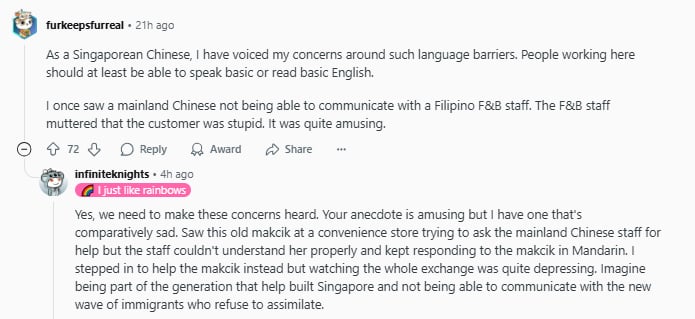
One user, who identified as Chinese, highlighted that even some Chinese Singaporeans struggle with reading Mandarin.
“As a Chinese who can’t really read Mandarin — yeah, they need to put English translations of the items. Come on lah, not everybody can read Mandarin. Even some Chinese people can’t read it too.”

“This is Singapore, not China,” one user remarked. “If they want to come here, they should integrate into our multiracial society.”
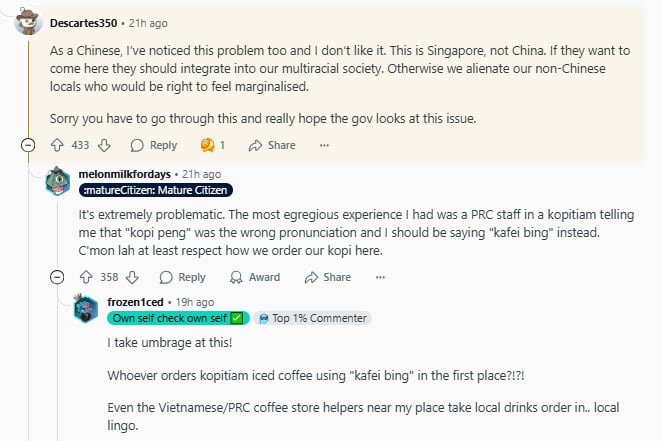
Others shared their own experiences, noting that the issue extended beyond eateries to retail shops as well.
“To be frank, it just feels exclusionary. Not only restaurants, but some of the shops are putting offers in Chinese these days,” one wrote.
Another mentioned struggling to communicate at Daiso, where the staff reportedly did not understand them.


English as a Social Bridge
Several users stressed that English plays a vital role in maintaining social cohesion in Singapore.
“English is the language that’s supposed to bridge the social divide between races and is an important element of the social fabric in Singapore,” one wrote.
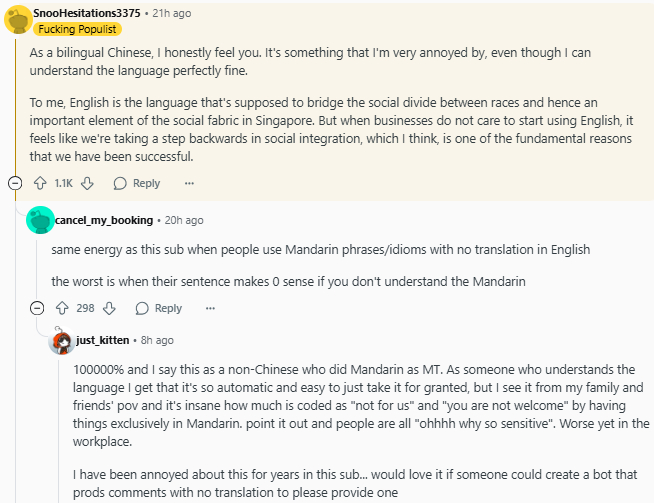
Another user added, “English is the lingua franca. It’s there so that everyone can communicate.”
They argued that while people are free to use their preferred languages privately, businesses should have basic English signage to serve the wider public.

One commenter compared the situation to Japanese, Korean, or Western eateries in Singapore.
They noted that although those establishments might not offer halal food, they still present their menus in English, allowing everyone — including non-Muslim minorities — to know exactly what they are eating.
“Those restaurants aren’t being exclusionary,” the user wrote.
However, they argued that Chinese eateries “don’t even make the effort to try at all because they know their pockets can get away with it.”
“Somehow these Chinese establishments don’t realise or don’t care we are a multicultural and multiethnic society,” the user added.
“We are not a Chinese country or society,” they continued, pointing out that such practices can eventually become — or may already be — an issue for Singapore society.
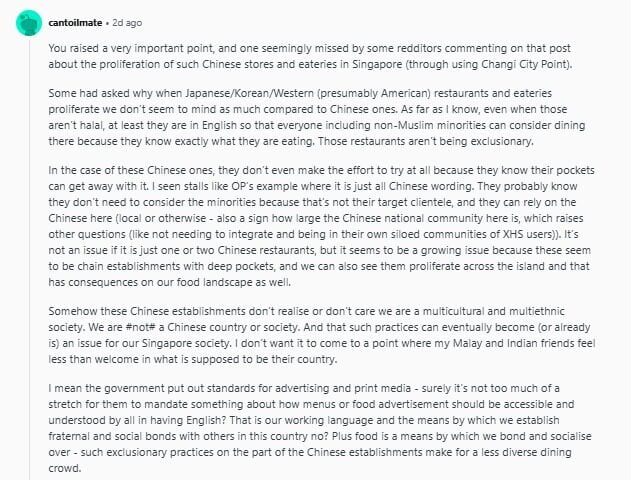
Calls for Language Requirements
Some netizens went further, calling for policy changes to ensure inclusivity.
One user suggested implementing basic English proficiency requirements for work pass applicants in customer-facing roles.
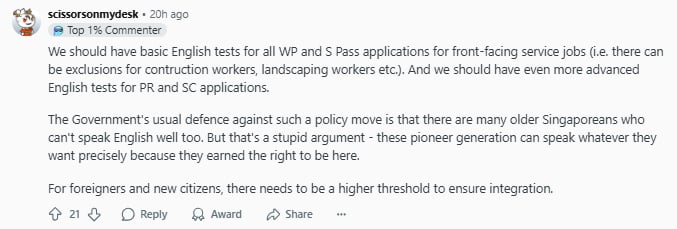
Another commenter proposed making it mandatory for all signage, advertisements, and menus in Singapore to include English, arguing that since English is Singapore’s administrative language, it should be a legal requirement for all F&B businesses to be able to operate in English.
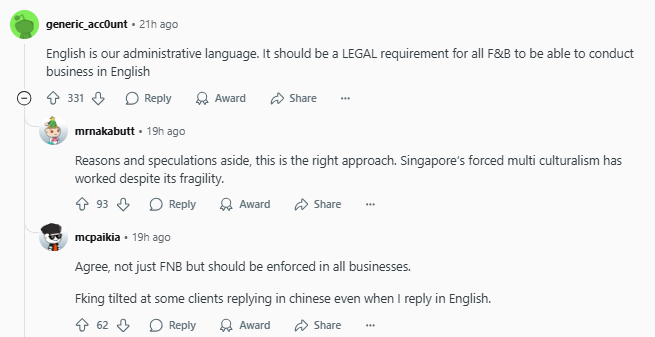

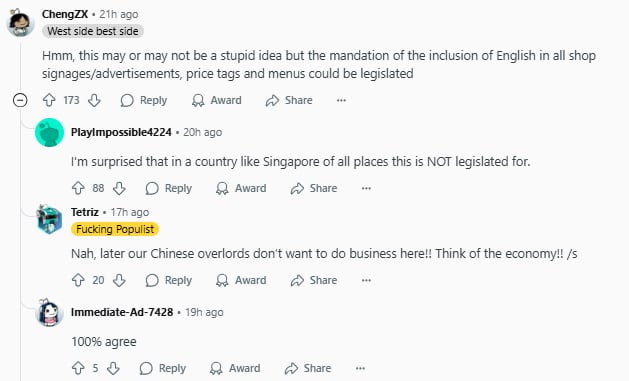
Not About Religion, But Inclusivity
Speaking to MS News, OP — who preferred to remain anonymous — clarified that the post was not about religion, but about inclusivity.
“It feels that our country’s culture has a tendency to not speak out, so I had to say it,” they said.
The Redditor noted that while they first noticed the trend in 2019, it became more common around 2022 after China reopened its borders.
They cited Bugis, Chinatown, Clementi, and Toa Payoh as neighbourhoods where Chinese-only signage was increasingly prevalent.
However, they also pointed out that some peers dismissed the issue altogether.
“They would brush it off as ‘not our problem, we won’t support them anyway,’ but I feel the issue is more than that,” the Redditor said, expressing concern that the lack of inclusivity in language could slowly erode Singapore’s multicultural fabric.
The post ‘Feels exclusionary’: Reddit user flags lack of English signage at Chinese eateries in Singapore appeared first on The Online Citizen.


